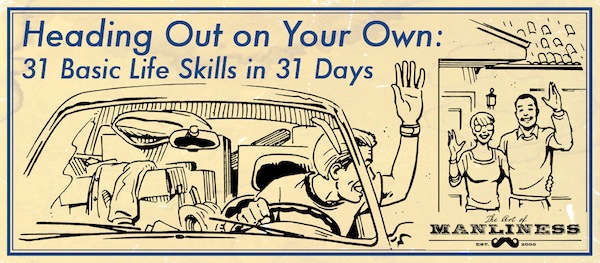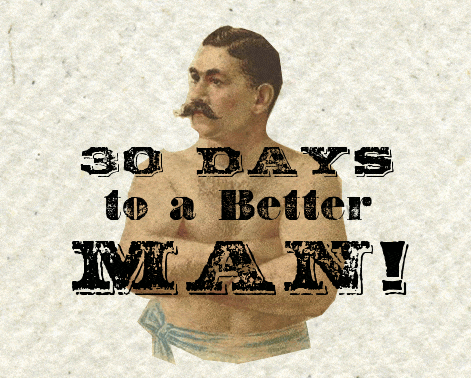
The prompts below are now available in a paperback journal, for completely offline reference and writing.
There’s been plenty of talk on AoM recently about journaling with our articles on The Diary Habit as well as 9 habits young men should adopt. Seeing a few of the comments confirmed a notion I already had about the practice of journaling: many men would like to, but few men do to the extent that they would like. And the main reason why? A simple lack of direction. When presented with a totally blank slate — that open journal, with pen in hand, and nothing but white pages — we freeze up. It’s been said that constraint actually gives way to greater creativity. When we have clear boundaries, or direction, we no longer have to think about the act itself. We don’t have to think about what to journal, we simply have to journal based on a prompt.
With that in mind, I’d like to present a 31-day roadmap and challenge for your journaling. Doing something for around 30 days is a great way to not only build a habit, but to also explore if it’s right for you. Maybe journaling isn’t for you, and you just have never taken the time to really prove that to yourself. Or maybe you love the practice, and simply haven’t gotten into the habit yet. Either way, I hope this calendar presents you with ample opportunity to take the journaling bull by the horns and experience all its benefits.
All of these can be accomplished in just 20-30 minutes per day, and often less. If you can’t make time for that, perhaps journaling isn’t as important to you as you really thought, and you’ve discovered right there that it’s not for you.
In this roadmap are many questions. In your journal — whether digital or by hand — you can simply write out the question at the top of the page, and answer as if having a conversation. Don’t worry about formality, how it may sound out loud, grammar, etc. Just write your thoughts. It may seem mundane, but there is a magical quality in writing something down that cannot be fully explained. You just have to trust me and try it out.
Note: I am of the opinion that this exercise should be 31 continuous days. However, you can also decide to do it over the course of a couple months, or just on weekdays; remember, this is for you, so if don’t enjoy what you’re doing and are just stressed out by the thought of it, it won’t work. Also, if you’re looking for a different journaling practice, check out our Ben Franklin Virtues Journal.
Day 1: Why do you want to journal? What would you like to get out of it?
Day 2: Manliness has been defined in different ways in different times. What does manliness mean to you?
Day 3: Decide on one positive habit you’d like to implement in your life. Whether seemingly mundane (flossing) or perhaps life-altering (exercising), write out the steps you’ll take to get there.
Day 4: Via negativa; today, pick a habit that you’d like to eliminate from your life. Think about the steps you’ll take to get rid of that negative habit, as well as how to keep yourself accountable.
Day 5: Write a letter to a loved one. Maybe it’s a wife, a parent, an estranged friend, or a grandparent you never really got to say goodbye to.
Day 6: Write a 6-word memoir of your life so far; that is, describe your life in one six-word sentence. With this limitation, you really have to filter your life to what you deem most important.
Day 7: You’ve made it one week! Reflect on what this newfound practice of journaling has been like. Have you enjoyed it? Has it been difficult? Has it been what you expected?
Day 8: Take some time to reflect on your career. Jot down a timeline of it. What was your best experience? The worst? What would you like your future to look like in regards to work?
Day 9: Simply write about your day. What time you woke up, what your commute was like, what you did at work, how you spent your evening. (If you’re journaling in the mornings, write about the previous day.)
Day 10: Identify where you are in the hero’s journey. You can take it in the context of your entire life, or within the context of a certain phase of life.
Day 11: From ancient times, men developed their manhood within a group of other men. Do you have a gang of friends who push and support you? If not, how could you make some good friends?
Day 12: Give stream-of-consciousness writing a try. This is where you just write out whatever comes into your head at the moment it comes into your head.
Day 13: Perform a mind dump of everything you’re worried about. From the leaky dishwasher to your family member’s poor health – get it all out. (Use David Allen’s GTD trigger list to help you out if needed.)
Day 14: Write a review of some form of entertainment you recently took in. Whether book or movie or TV show or Broadway play, write out what you liked and didn’t like about it. Were there any lessons to be gleaned, or was it pure entertainment (it’s okay if it was!)?
Day 15: Come up with your own Cabinet of Invisible Counselors. There are innumerable great men from history who we can learn from today. Write out who you would have on your list and what you admire about them.
Day 16: Imagine that someone has decided to write a book about your life, up to this point. What would the cover blurb say? Are you happy with it? Now imagine what you’d like that blurb to say at the end of your life. What changes need to be made for that to happen?
Day 17: Hop on the internet and search for the biggest news stories in the year you were born. Think about how these news stories, or even statistics, may have shaped your childhood or who you are today.
Day 18: Identify one project you’d like to complete with your hands, whether chore or craft. Detail the steps, the resources, and the help you’ll need to complete the project. Then, set about doing it!
Day 19: Reflect on your romantic relationship, and identify one area you’d like to improve. If you don’t have a romantic partner in your life, identify past failures you’d like to improve on. If you’ve never been in a relationship, describe your ideal one.
Day 20: Think about the period of your life for which you have the greatest nostalgia. Once you identify that time period, think of why you’re so nostalgic about it. What elements could you revive in your life now?
Day 21: Focusing on big goals can overwhelm us into inaction. Think on the Japanese philosophy of Kaizen – simply getting 1% better each day. What’s something really small you can start doing every day that will create a compounding effect in your life?
Day 22: Imagine you’ve been provided with a livable income for the rest of your life. You have no need to work, but aren’t rolling in money either. How would you spend your time? Your answer will say a lot about you and what your passion may be.
Day 23: Make a list of things that distract you. It could be your smartphone, or even something that’s actually beneficial, but eats up more time than you’d like. What could you do to better manage these distractions in your life?
Day 24: Memento mori. “Remember that you will die.” Meditate on this, and write out your thoughts. Does death scare you? Does it motivate you?
Day 25: Pick 1-2 quotes from our 80 quotes on manhood and reflect on why they stand out to you.
Day 26: For three days, we’ll work from AoM’s “Craft the Life You Want” series. Today, work on crafting a life plan. It can be a long process, so if you’re short on time, start by defining your various roles as a man, and your ultimate purpose and goals within those roles.
Day 27: The place where we live has a tremendous impact on our lives. Take a look at the eight factors that should be considered when choosing where to live. Are you living in the right place, or should you consider a move?
Day 28: Finally in this three-day journey, we’ll consider the “tools” necessary to make your life a masterpiece. Decide which tools you need to attain, if there are any others that are needed, and how you’ll go about acquiring these tools.
Day 29: Excess pride can cause you to stumble, but healthy pride is a potent source of fulfillment and motivation. Write about the thing you do in your life that brings you the most pride – be it your job, a hobby, your family life and relationships, etc.
Day 30: Jot down a list of all the things you’re grateful for – big or small, broad or specific.
Day 31: Reflect on the last month of journaling. Did you enjoy the experience? What did you learn about yourself? What was most difficult? Will you continue the practice? If so, take some time to map out how you’d like your journaling habit to continue.






